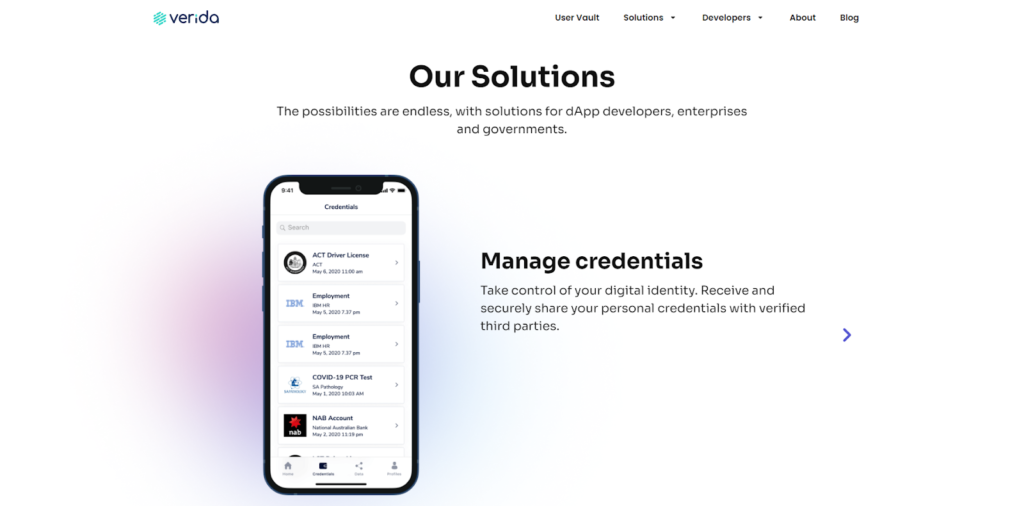Verida is Combining Privacy Data Storage Solution and Identity Building Toolkit for Web3 Developers

The internet is now in a liminal period. It’s ready to jump off the ledge and into uncharted territory, with repercussions that we could have only imagined ten years ago. The third edition of the internet is Web3. It’s exciting to see how rapidly digital technology is opening up.
A vibrant community of open coders is creating this new web. It means that the internet is trustless, allowing users to interact directly with one another without intermediaries obtaining their information. Finally, it implies that everyone is invited to participate, with no need for a regulatory body.
Under the right conditions, Web 3.0 might bear more decentralized, open, and secure internet connections. Individuals, not corporations, and privacy rather than money must have sovereignty to make Web 3.0 a reality.
Verida is combining privacy data storage technologies with a web3 developer toolkit to help web3 builders develop decentralized apps (dApps) more quickly. To speed up the adoption of Web3, Verida is integrating privacy data storage solutions with a toolkit for building online identities.
In order to propel greater control over data and privacy, Verida Protocol’s alpha release is now live for Web3 developers. This release includes the Verida Client SDK, Single Sign-On (SSO) SDK, Storage Node and Verida Vault (iOS, request invite via Discord).
Transitioning from Web2 and Internet Innovations to Web3
The mid-2000s saw the emergence of cloud computing, smartphone technology, and social media in the form of Internet 2.0 innovations. Since then, data processing and collection have grown in popularity. Because there is little regulation on data harvesting and use, it has become a source of capital gains and marketing success.
This has been addressed by legislation such as GDPR and MiFID II in Europe, which have pushed governments to regulate the issue. In addition to stronger antitrust rules in the United States intended to protect consumer rights.
Nonetheless, the fundamental issue is that data is a precious resource. Data security, on the other hand, does not chime with big businesses’ objectives.
- Privacy
When data is not properly protected, it is highly susceptible to losses, modifications, and breaches. Last year, approximately 4,000 data breaches resulted in the leakage of more than 37 billion records in the United States.
To run a successful company, many organizations must deal with numerous businesses. For example, when a bank requires information on a client’s payment history from a loan provider. When you copy data, a new duplicate is made. A mistake or faulty data might be reproduced or changed with this copy.
The current shortcomings of these centralized systems can be addressed by Web3. It’s possible that future technological developments on the internet will prioritize privacy.
To address this, Verida Datastore enables developers to quickly develop self-sovereign applications in which customers have control of their data. Web3 developers can benefit from this tool through user-controlled data, decentralized apps (dApps), and their respective technologies.
- Web3 and decentralized identities
The creation of secure digital identities will be another key component of Web 3’s decentralization. The current model of internet identity verification on the internet is outdated and riddled with flaws. We must provide sensitive personal information to perform just about any activity online. There’s little control over how it’s conveyed and protected.
Decentralized identification tools already exist in the form of blockchain-based applications. These allow users to retain complete control over their personal data. They can then decide whether and when to share it by issuing access through private keys.
Conclusion
The project is a decentralized network of personal data owned and controlled by users, incentivizing them to unlock their information stored on centralized platforms. This data is also available to builders for new innovative web3 applications. Users can regain control and privacy over their personal data with Verida Protocol, which allows them to take complete control and anonymity. Our users may benefit from their data based on their decisions and preferences.
The Web 3.0 model will allow customers to trade products and services without third parties, including online marketplaces and banks. People may also monetize their data and create more efficient business models for the benefit of everyone involved.